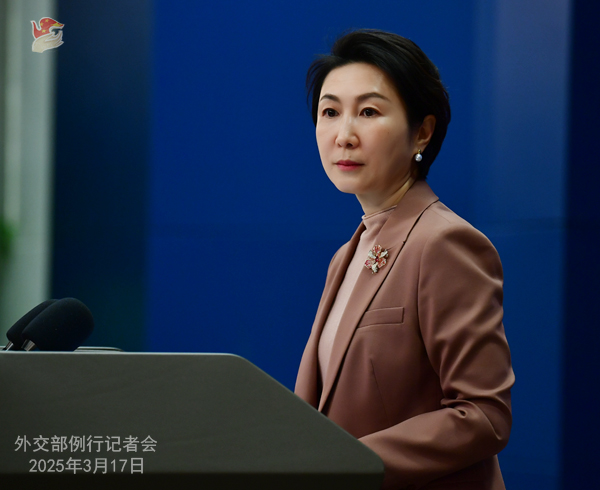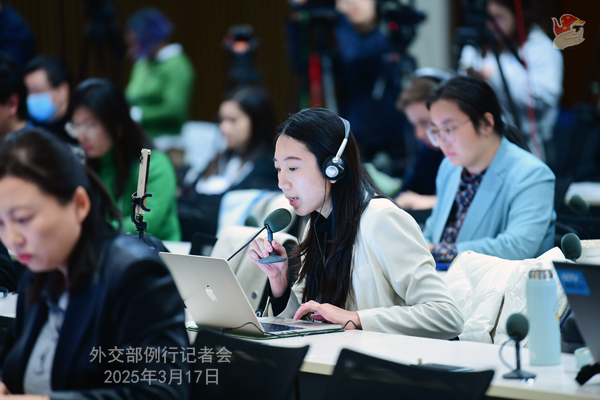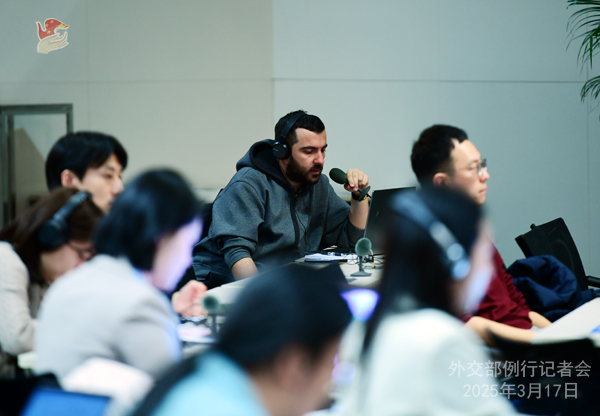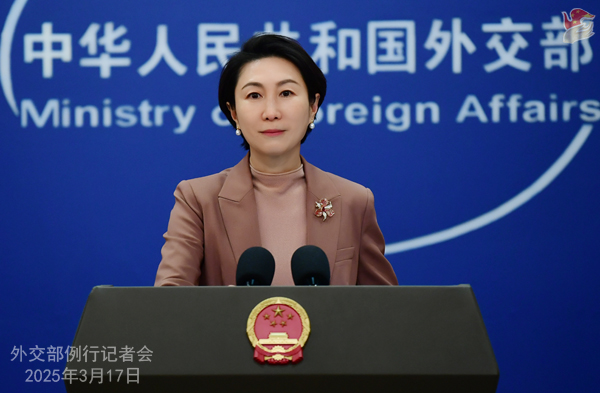
CCTV: Recently, the Foreign Ministers of the G7 issued the Statement of the G7 Foreign Ministers’ Meeting and the G7 Foreign Ministers Declaration on Maritime Security and Prosperity to propagate China-related issues again. They made irresponsible remarks on the Taiwan question and maritime issues and expressed concerns over the alleged provision of weapons and dual-use components to Russia by China, China’s so-called overcapacity and military build-up, etc. Do you have any comment?
Mao Ning: The joint statement of the G7 Foreign Ministers’ meeting and their declaration are a deliberate mischaracterization of the facts and truth, which seek to vilify China and interfere in China’s internal affairs. We strongly deplore and firmly reject that and have lodged serious protests with relevant countries.
Let me stress that the Taiwan question is at the core of China’s core interests, which brooks no external interference. The situation in the South China Sea is generally stable. Freedom of navigation and overflight in the South China Sea has never been an issue. The G7 should stop sowing discord and provoking disputes. China has all along been promoting talks for peace on the Ukraine issue, never provided lethal weapons to any party to the conflict and exercised strict export control over dual-use articles. We absolutely reject the G7’s blame-shifting.
China is committed to peaceful development, follows a national defense policy that is defensive in nature and always keeps its nuclear strength at the minimum level required by national security. China’s national defense spending is made to safeguard our nation’s sovereignty, security and development interests and it is open, transparent, reasonable and appropriate. The G7 says nothing about the U.S.’s responsibility in disarmament and the risks of nuclear proliferation posed by AUKUS, and chooses to direct the issue at China instead. This is out-and-out double standards. The narrative of “Chinese overcapacity” has been proved false by facts. The G7 should stop politicizing and weaponizing trade and economic ties and stop undermining the international economic order and destabilizing global industrial and supply chains.
We call on the G7 to see the trend of history, discard the Cold War mentality and ideological bias, stop undermining China’s sovereignty and interfering in China’s internal affairs and stop stoking antagonism and bloc confrontation. They need to focus on major issues including addressing global challenges and promoting global development and do more things that are conducive to international solidarity and cooperation.
China News Service: Recently, 40 Chinese nationals detained in Thailand were repatriated to China. U.S. Secretary of State Marco Rubio announced sanctions including visa restriction policy that will apply to Thai government officials involved in the deportation cooperation. The Foreign Affairs Ministry of Thailand issued a statement stressing that the Thai government has clarified this matter on multiple occasions and that Thailand has always upheld a long tradition of humanitarianism. It is also noted in the statement that Thailand values the alliance with the U.S., but the ties should be based on mutual respect. What’s your comment?
Mao Ning: China and Thailand, as two sovereign nations, working together to crack down on human smuggling and other cross-border crimes is in line with domestic laws of both countries as well as international law and common practices. The U.S. has no right to interfere in such cooperation. The 40 Chinese nationals, under wrong influence, illegally crossed the border and ended up stranded in Thailand, where they were detained for over a decade. The Chinese government has the obligation and responsibility to protect its citizens and help them reunite with their families and resume normal lives.
By politicizing this issue, the U.S. is in nature applying double standards and suppressing dissent. The U.S. Immigration and Customs Enforcement (ICE) reported the removal of over 270,000 noncitizens to 192 different countries during the 2024 fiscal year, marking the highest level of deportations since 2014. The U.S. on the one hand engages in indiscriminate deportation against illegal immigrants, yet on the other points fingers at and smears other countries’ legitimate law enforcement cooperation, and slaps sanctions and puts pressure on others. This is typical bullying.
China strongly condemns all ill-intentioned vilification and illegal sanctions against China and Thailand, and firmly opposes the U.S. manipulating Xinjiang-related issues under the pretext of human rights, interfering in China’s domestic affairs, and disrupting the normal law enforcement cooperation between China and relevant countries. China will continue to enhance communication and coordination with relevant countries on the basis of mutual respect and equal-footed consultation, protect the lawful rights and interests of Chinese citizens and work for stronger international law enforcement cooperation.
Global Times: It was reported that recently, a Japanese Diet member submitted a letter of inquiry to the Japanese government, saying that the 1972 China-Japan Joint Statement contains the words that “The Government of the People’s Republic of China reiterates that Taiwan is an inalienable part of the territory of the People’s Republic of China. The Government of Japan fully understands and respects this position of the Government of the People’s Republic of China,” and the Diet member asked whether Japanese local governments and local councilors have the legal obligation to observe this position. In response to this, the Japanese government issued a reply letter, claiming that the 1972 China-Japan Joint Statement is “not legally binding.” The reports say that successive Japanese cabinets all believe that the joint statement is “not legally binding”, and the reply letter once again shows that the Joint Statement does not restrict Japanese local councilors’ activities in Taiwan. What is China’s comment?
Mao Ning: There is but one China in the world, Taiwan is an inalienable part of China’s territory, and the government of the People’s Republic of China is the sole legal government representing the whole of China. China firmly opposes official interaction of any form between China’s Taiwan region and countries having diplomatic ties with China. The one-China principle is the political foundation of China-Japan relations.
In 1972, the Chinese and Japanese governments signed the China-Japan Joint Statement, in which the Japanese side explicitly pledged that “The Government of Japan recognizes the Government of the People’s Republic of China as the sole legal Government of China. The Government of the People’s Republic of China reiterates that Taiwan is an inalienable part of the territory of the People’s Republic of China. The Government of Japan fully understands and respects this position of the Government of the People’s Republic of China, and it firmly maintains its position under Article 8 of the Potsdam Proclamation.” Article 8 of the Potsdam Proclamation reiterates that the “terms of the Cairo Declaration shall be carried out.” And the 1943 Cairo Declaration explicitly demands that “all the territories Japan has stolen from the Chinese, such as Manchuria, Formosa, and the Pescadores, shall be restored” to China. These documents not only confirm the fact that Taiwan belongs to China, but also constitute the legal basis for ending the state of war between the Allied Nations and Japan and building the post-war international order in the Asia-Pacific. They certainly are legally binding.
In 1978, China and Japan signed the Treaty of Peace and Friendship Between China and Japan, in which the two sides affirmed that the China-Japan Joint Statement “constitutes the basis for relations of peace and friendship between the two countries and that the principles set out in that statement should be strictly observed.” The treaty was signed by the Chinese and Japanese governments, and officially came into effect after deliberation and approval by the legislators of the two countries. It affirmed the principles and contents of the joint statement in legal terms and is certainly legally binding.
Taiwan has been back under China’s sovereign jurisdiction for 80 years. The Japanese side attempted to obscure historical facts regarding the Taiwan question, which severely misleads the Japanese people, violates the Japanese government’s promise of adhering to the one-China principle, challenges the political foundation of China-Japan relations and sends a significantly wrong message to the “Taiwan independence” forces. We firmly oppose this. We seriously urge the Japanese side to abide by the principles and spirit of the four political documents with China, earnestly fulfill relevant legal obligations, act prudently on the Taiwan question and honor its promise of adhering to the one-China principle with concrete actions.

Reuters: Our question is about the visit to Panama by a delegation of the Communist Party of China from Friday to Saturday. This delegation was led by the Vice Minister of the CPC’s international department. Our questions are what did the delegation do in Panama? What was conveyed to the Panama people and also did the delegation visit the Panama Ports Company?
Mao Ning: China has released a readout on the CPC delegation’s visit to Panama, which you may refer to. For more specifics, I’d refer you to competent Chinese authorities.
AFP: Houthi rebels said today that they had attacked a U.S. aircraft carrier group in retaliation for American strikes in Yemen. Does the Foreign Ministry have a comment on the U.S. strikes and also on the Houthis’ retaliation there?
Mao Ning: China opposes any moves that escalate tensions in the Red Sea. There are complex reasons behind the situation in the Red Sea and the issue of Yemen, and they should be properly settled through dialogue and negotiation.
PTI: Prime Minister of India Mr. Narendra Modi has spoken about India-China relations in an interview, stating the competition should never turn into conflict and both countries are working to restore the relations after his meeting with the Chinese leader in October last year. Some of the salient points of his interview were that the differences are natural. When two neighboring countries exist, occasional disagreements are bound to happen. But our focus is to ensure that these differences don’t turn into disputes. That’s why we have actively worked towards dialogue instead of discord. We stress dialogue because only through dialogue, can we build a stable cooperative relationship that serves the best interest of both countries. I would like to have your view on this.
Mao Ning: China appreciated Prime Minister Narendra Modi’s recent positive statements on China-India relations. The successful meeting between President Xi Jinping and Prime Minister Narendra Modi in Kazan last October provided strategic guidance for the improvement and development of the bilateral ties. Both sides have earnestly followed through on the important common understandings of our leaders, strengthened exchanges and practical cooperation at all levels, and achieved a series of positive outcomes.
Let me stress that in the two-thousand-year-plus history, the mainstream of China-India interactions has been friendly exchanges and mutual learning. This greatly contributes to the progress of civilizations and humanity. As the two largest developing countries, China and India have a shared task to achieve respective development and revitalization, and should understand and support each other, and help each other succeed. This serves the fundamental interests of over 2.8 billion people in the two countries, meets the common aspiration of regional countries, follows the historical trend of the Global South growing stronger, and is conducive to world peace, stability, development and prosperity. The two countries should be partners that contribute to each other’s success. A cooperative pas de deux of the dragon and the elephant is the only right choice for both sides.
China stands ready to work with India to implement the important common understandings between the two leaders, take the 75th anniversary of China-India diplomatic relations as an opportunity, promote exchange and cooperation in various fields and at all levels, and advance China-India relations on the track of sound and stable development.
CCTV: Sources say that the Taiwan authorities are going to set foreign missions in a handful of countries or use the term “Taiwan” over “Taipei” in relevant institutions. What’s your comment?
Mao Ning: The one-China principle is a well-recognized norm in international relations, a prevailing consensus in the international community and the political foundation for China to establish and grow its relations with other countries. The government of the People’s Republic of China is the sole legal government representing the whole of China. Taiwan is never a country, not in the past, and never in the future.
For quite some time, the DPP authorities have used exchange and cooperation in economy, trade, technology, culture, and education, among other fields, as a pretext to drill through the rock-solid international commitment to the one-China principle, and expand so-called “international space.” They have coerced or cajoled other countries through dollar diplomacy and bribes to set new institutions or rename existing ones in some countries, tempt them to cross, trample on or make moves on the margins of the red line of the Taiwan question, and destroy their relations with China. Our message to the DPP authorities is that China’s reunification cannot be hindered, and relying on external forces for independence cannot succeed.
China has all along opposed official interaction of any form between the Taiwan authorities and countries that have diplomatic relations with China. We hope relevant countries will see through the Taiwan authorities’ ill-intentioned schemes, abide by the one-China principle with concrete actions, and uphold the political foundation of their relations with China.

EFE: Will the Chinese leader attend the summit between China and the European Union this year in Brussels on the occasion of the 50th anniversary of diplomatic relations?
Mao Ning: China always attaches great importance to the EU and China-EU relations, and stands ready to work with the EU to enhance dialogue and cooperation at all levels and in various areas. In 2024, the historic visit by President Xi Jinping to Europe was a great success and he had in-depth communication and exchanges with European leaders on bilateral and multilateral occasions. Earlier this year, President Xi Jinping had a phone conversation with European Council President Antonio Costa, and the conversation laid the foundation and charted the course for this year’s development of China-EU relations.
This year marks the 50th anniversary of diplomatic ties between China and the EU and a crucial time as the relationship goes into the next chapter. We stand ready to work with the EU to implement the important common understandings reached between leaders of the two sides, successfully hold events to celebrate the 50th anniversary, enhance high-level exchanges, dialogue and cooperation and work for sustained and steady progress in growing China-EU relations.
Xinhua News Agency: This week marks the Lancang-Mekong Cooperation (LMC) Week of 2025. What are the highlights of the celebration of the LMC Week? How does China view the progress made in Lancang-Mekong Cooperation and what’s China’s expectation for future cooperation?
Mao Ning: The people of the six LMC countries have not only a shared river but also a shared future. As a new regional cooperation mechanism participated by six countries under the principle of extensive consultation, joint contribution, and shared benefits, the Lancang-Mekong Cooperation has made impressive progress since its inception and has become a golden platform for regional countries to jointly pursue development. Under the guidance of President Xi Jinping and leaders of the five Mekong countries, China has forged a community with a shared future with all Mekong countries bilaterally or multilaterally. Strategic projects on connectivity, such as China-Laos Railway and Phnom Penh-Sihanoukville Expressway, continue to play their comprehensive role as golden routes. Trade volume between China and the five Mekong countries reached US$437 billion, up by 125 percent compared with the trade size when the mechanism was launched. The development of the innovation corridor is steadily progressing. Digital and green technologies continue to be an enabler of industrial development. The Fudan No.1 Lancang-Mekong Future Satellite has brought the tech dream of many youngsters from LMC countries into space. China launched small and smart projects, such as the Lancang-Mekong visas, the Lancang-Mekong Sweet Spring Action and the Green Lancang-Mekong Initiative, bringing more tangible benefits to people living along the river. The six countries jointly cracked down on such cross-border crimes as online gambling and scam and made all-out effort to protect the safety of life and property of local people in the region.
This year marks the 10th year of LMC. In the LMC Week this year we will witness a variety of celebratory activities. More than 90 activities will be jointly held by over 20 departments of the Chinese central government and Chinese diplomatic missions overseas and more than 10 Chinese provincial and municipal localities as well as governmental agencies, think tanks, universities, media and businesses of the five Mekong countries. There are three highlights in these events: first, following a people-centered philosophy. Activities will be organized in light of local conditions and features, including art performances, cultural lectures, workshops on intangible cultural heritage handicraft, the Lancang-Mekong cultural festival and an exhibition featuring colorful Lancang-Mekong, showcasing the unique cultural customs of the Lancang-Mekong region. Some institutions will organize activities celebrating the spirit of humanity in LMC, including non-profit medical activities, a seminar on energy and power cooperation and a field trip to experience connectivity between LMC countries. Second, focusing on development. Activities including entrepreneur forums, trade fairs, product design competitions and skills training will be held under the themes of connectivity, low-carbon transformation, cross-border economy, women and poverty reduction, which will serve the integrated development of the region. Third, aiming at the future. Events will be held for Generation Z, Generation Alpha, and young scientists and students, such as youth exchange programs, innovation contests, scholarship projects, scientific research camps and competitions for college students. These events will inject the vitality of the youth into the Lancang-Mekong cooperation. If you are interested, please stay tuned.
The fifth LMC Leaders’ Meeting and the tenth LMC Foreign Ministers’ Meeting will be held later this year. China stands ready to work closely with the five Mekong countries to further improve and upgrade our cooperation across the board, and work for Lancang-Mekong Cooperation 2.0. The six countries will continue to carry forward the spirit of “development first, equal consultation, pragmatism and efficiency, and openness and inclusiveness”, join hands to pursue modernization, actively forge a stronger Lancang-Mekong Economic Development Belt, build a closer community with a shared future among LMC countries and make LMC countries’ contribution to regional peace and development with more stability.
China Daily: We have learned that the Chinese military has conducted drills near the Taiwan Strait. Some believe this has something to do with the U.S. State Department’s recent revisions to the statements on its Taiwan policy on its website and “Taiwan independence” forces’ unconscionable acts. What’s China’s comment?
Mao Ning: The U.S. has recently taken a series of wrong steps on the Taiwan question. In particular, the U.S. State Department removed important statements that show the U.S. is committed to the one-China policy and does not support “Taiwan independence” in the fact sheet of its so-called relations with Taiwan on the website, which shows the U.S. gravely backpedaled on its position on Taiwan-related issues. This is another egregious example of the U.S.’s intention of using Taiwan to contain China, and its move to abet and aid “Taiwan independence”, which sends a gravely wrong signal to “Taiwan independence” separatist forces. China’s relevant military operation is necessary, lawful and legitimate in order to defend national sovereignty, security and territorial integrity. It’s a firm response to external forces who are hellbent on abetting and aiding “Taiwan independence”, and a warning to “Taiwan independence” separatist forces’ unconscionable acts.
Let me stress that the Taiwan question is at the very core of China’s core interests and the one-China principle is the bedrock of the political foundation of China-U.S. relations. If the foundation is shaken, whatever above it cannot stand. “Taiwan independence” and cross-Strait peace and stability are as irreconcilable as fire and water. The pursuit of “Taiwan independence” will lead nowhere. Those who attempt to use Taiwan to contain China will get burned for playing with fire. We urge the U.S. to abide by the one-China principle and the three China-U.S. joint communiqués, honor the solemn commitment made by U.S. administrations on the Taiwan question, stop crossing the line and making provocations, handle the Taiwan question with extra prudence, and avoid further severe damage to China-U.S. relations and peace and stability in the Taiwan Strait.
Bloomberg: Both the FT and Bloomberg have reported that the Chinese leader may meet with some global CEOs later this month. We’re wondering if you can confirm this or if you have any comment?
Mao Ning: I have nothing to read out on that.
